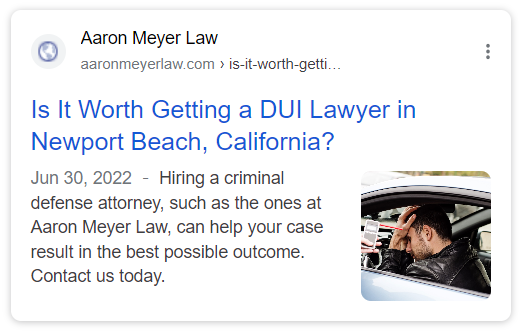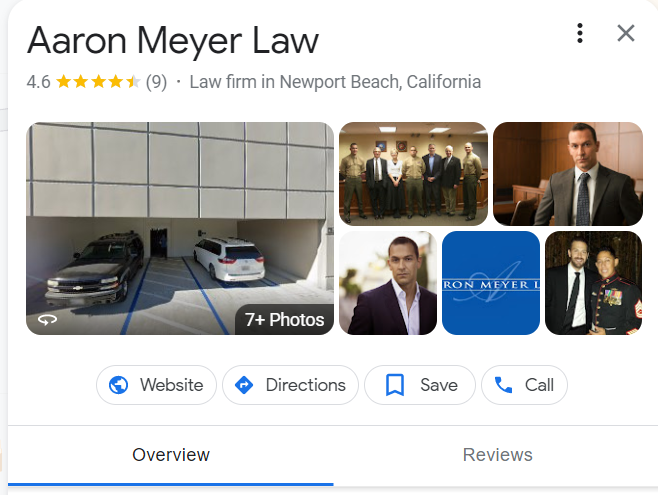
In today’s digital landscape, having a strong online presence is crucial for the success of any law firm. In this blog, we provide a concise yet powerful guide on SEO for lawyers. Discover actionable strategies and expert tips to optimize your website, attract more clients, and elevate your legal practice in the digital world. Boost your visibility and stay ahead of the competition with our essential SEO insights
Today, people rely more on the internet than ever to find solutions to their problems, including legal services. In this context, SEO for lawyers has become an essential component of any law firm’s marketing strategy. By utilizing SEO techniques, law firms can enhance their online presence, attract potential clients, and outperform their competitors in the digital space.
Effective SEO for lawyers involves a combination of technical and content optimization strategies. Law firms must optimize their website’s structure and code to ensure it meets search engine algorithms’ requirements, including mobile-friendliness, fast loading times, and user-friendliness. At the same time, they must also produce high-quality, informative, and relevant content that addresses the needs and queries of their target audience.
 For lawyers, SEO requires a thorough understanding of the legal industry’s landscape and the target market’s search behavior and preferences. By conducting comprehensive keyword research and analysis, law firms can identify the most relevant and profitable search terms and phrases to target in their SEO campaigns. By implementing the correct SEO strategies, law firms can optimize their website and content to rank higher on search engine results pages (SERPs), driving more organic traffic and generating more leads for their business. This guide will provide insights into SEO for lawyers, covering its importance, benefits, and effective practices.
For lawyers, SEO requires a thorough understanding of the legal industry’s landscape and the target market’s search behavior and preferences. By conducting comprehensive keyword research and analysis, law firms can identify the most relevant and profitable search terms and phrases to target in their SEO campaigns. By implementing the correct SEO strategies, law firms can optimize their website and content to rank higher on search engine results pages (SERPs), driving more organic traffic and generating more leads for their business. This guide will provide insights into SEO for lawyers, covering its importance, benefits, and effective practices.
Search engine optimization (SEO) is a digital marketing discipline focused on optimizing websites and content for higher rankings on SERPs. SEO consists of several techniques, including keyword research, on-page optimization, link building, and technical SEO, which work together to improve search engine rankings and drive more organic traffic to a website. Sites can achieve a higher ranking by targeting specific keywords and phrases that users enter when searching for information.

For law firms, SEO is crucial because most potential clients turn to search engines like Google to find legal services. Studies have shown that websites on the first page of search results receive more than 90% of the click-through traffic. By implementing effective SEO strategies, law firms can improve their search engine rankings, which leads to increased online visibility, more qualified leads, and a better return on investment (ROI). Furthermore, a well-optimized website contributes to a more seamless user experience, which can significantly impact user engagement and conversion rates.
Increased online visibility: With most clients using search engines to find legal services, having a robust online presence is essential. A strong online presence drives more organic traffic and helps law firms build brand awareness and recognition. SEO helps law firms rank higher on search engine results pages, increasing visibility and attracting more potential clients.
More qualified leads: SEO targets specific keywords related to a law firm’s practice areas, ensuring the website’s visitors are genuinely interested in the services offered. This focused approach results in more qualified leads, as users are more likely to need legal assistance and actively search for a lawyer. These highly targeted leads have a higher chance of converting into actual clients, translating into a better ROI.
Boosting credibility and authority: A higher SERP ranking signals to potential clients that a law firm is credible and authoritative. Search engines like Google have rigorous algorithms that evaluate the quality and relevance of content. By ranking high on search results, law firms are perceived as more reputable and trustworthy, increasing the likelihood that potential clients will engage in their services.
Staying competitive in the digital landscape: The legal industry is highly competitive, with numerous law firms vying for the attention of potential clients. SEO levels the playing field by providing law firms an edge in the digital space. A solid SEO strategy allows law firms to compete effectively, regardless of size or marketing budget. It is a cost-effective marketing strategy that ensures long-term growth and visibility.
Enhancing user experience: SEO is not only about search engine rankings but also involves optimizing a website’s overall user experience. SEO practices like structured data markup and clear calls-to-action help users find the information they need more quickly and efficiently. Site speed, mobile-friendliness, and easy navigation contribute to higher rankings and improved user experience. A well-optimized website with valuable content attracts more visitors and encourages them to stay longer, engage with the site, and potentially convert into clients.
Law firm SEO specialists are professionals dedicated to helping law firms improve their online presence and visibility through search engine optimization. They possess a deep understanding of both the legal industry and SEO best practices, which allows them to create customized strategies that cater to the unique needs of a law firm. By working with an experienced law firm SEO specialist, attorneys can effectively reach their target audience, generate more qualified leads, and ultimately, grow their practice. Some of the value-adding services an SEO specialist can provide include:
Evaluating website structure: Law firm SEO specialists begin by assessing a law firm’s website structure to ensure it adheres to SEO best practices. This assessment examines the site’s layout, navigation, URL structure, and internal linking. A well-structured website improves user experience and makes it easier for search engines to crawl and index the site.
Identifying areas for improvement: After assessing the website’s structure, SEO specialists identify areas that require optimization. This may include fixing broken links, optimizing title tags and meta descriptions, improving page load speed, and ensuring mobile-friendliness.
Assessing content quality: Quality content is crucial for SEO success. Law firm SEO specialists review the website’s content to determine its relevance, uniqueness, and value to users. They also check for keyword usage, readability, and overall presentation, suggesting improvements to enhance the site’s search engine performance.

Reviewing backlink profile: Backlinks are critical in determining search engine rankings. Law firm SEO specialists analyze the website’s backlink profile to identify the number and quality of inbound links. They assess the credibility of the linking sites and recommend strategies to acquire high-quality backlinks to boost the site’s authority.
Keyword research and optimization: SEO specialists conduct extensive keyword research to identify relevant terms and phrases that potential clients are likely to search for. They optimize the website’s content by incorporating these keywords in a natural, non-spammy manner, ensuring the content remains informative and engaging.

Content creation and optimization: Law firm SEO specialists help create and optimize content that resonates with the target audience. This includes crafting compelling blog posts, articles, and landing pages that provide valuable information while addressing the needs and concerns of potential clients. Additionally, they ensure content adheres to SEO best practices, such as proper formatting, keyword usage, and internal linking.
Technical SEO: Technical SEO involves optimizing a website’s infrastructure to improve search engine visibility. Law firm SEO specialists work on elements such as XML sitemaps, robots.txt files, site speed optimization, and mobile-friendliness to ensure a seamless user experience and better crawling and indexing by search engines.
Link building: High-quality backlinks are crucial for improving a website’s search engine rankings. Law firm SEO specialists develop and execute link-building strategies, including guest posting, outreach campaigns, and shareable content creation, to acquire authoritative backlinks that boost the site’s credibility and search engine performance.
Tracking and analyzing key performance indicators (KPIs): Law firm SEO specialists monitor KPIs such as organic traffic, search engine rankings, bounce rate, and conversion rate to gauge the effectiveness of the implemented SEO strategies. They use analytical tools to collect and interpret data, providing valuable insights into the website’s performance.
![]()
Ongoing optimization: SEO is a continuing process that requires continuous efforts and adjustments. Law firm SEO specialists make data-driven decisions to fine-tune the strategies, addressing any issues or areas for improvement that arise. This may involve updating content, refining keyword targeting, or adjusting technical SEO elements to ensure the website continues to perform well in search engine rankings.
Adapting to search engine algorithm updates: Search engines frequently update their algorithms, impacting a website’s rankings. Law firm SEO specialists stay up-to-date with the latest algorithm changes and adjust their strategies to maintain or improve the website’s search engine performance. This proactive approach ensures the law firm’s online presence remains strong and competitive in the ever-evolving digital landscape.
Search engine optimization (SEO) services for lawyers focus on improving the online visibility of law firms, helping them attract potential clients and grow their practice. These specialized services understand the unique needs and challenges of the legal industry and tailor their approach accordingly. By employing various techniques such as keyword research, content creation, and on-page and off-page optimization, SEO services for lawyers can significantly enhance a law firm’s search engine rankings and drive more organic traffic to their website. This article will delve into finding the best keywords for law firms and writing attorney website SEO content, both critical aspects of a successful law firm SEO strategy.
Keyword research is a crucial aspect of search engine optimization (SEO) that involves identifying and analyzing the search terms and phrases that potential clients use when seeking legal services online. By incorporating these keywords into their website content, law firms can enhance their visibility on search engine results pages (SERPs) and attract more qualified leads. An effective keyword research strategy can significantly impact a law firm’s online success in today’s competitive digital landscape.

SEO services for lawyers employ various tools and techniques, such as Google Keyword Planner and SEMrush, to pinpoint high-value keywords that can significantly enhance a law firm’s search engine performance. High-value keywords are vital in driving relevant traffic to a law firm’s website, as they possess a substantial search volume and a strong correlation with the firm’s practice areas. These keywords are more likely to result in conversions, as users searching for them specifically seek the firm’s legal services.
A crucial aspect of keyword research is understanding the difference between long-tail and short-tail keywords. Long-tail keywords are more extended, detailed phrases often addressing a specific legal issue or service, such as “personal injury attorney in Los Angeles” or “employment discrimination lawyer near me.” In contrast, short-tail keywords are general, shorter terms like “lawyer” or “attorney.”
To optimize search visibility and attract a diverse range of potential clients, SEO services for lawyers typically target both long-tail and short-tail keywords in their strategies. Although long-tail keywords usually have lower search volumes than short-tail ones, they often boast higher conversion rates. This is because users searching for long-tail keywords are more likely to be further along in the decision-making process and actively seeking specific legal services.
In addition to identifying high-value keywords, it’s essential for law firms to analyze their competition and assess the difficulty of ranking for specific keywords. Keyword difficulty is a metric that indicates how challenging it will be for a website to rank for a particular keyword, considering factors such as the authority and relevance of competing websites. Using tools like Moz’s Keyword Explorer and Ahrefs’ Keyword Difficulty tool, law firms can gain insights into their competitors’ keyword strategies and determine which keywords are worth targeting based on their potential return on investment.
![]()
A successful keyword strategy for law firms should encompass a mix of high-value, long-tail, and short-tail keywords. This approach ensures that the firm’s website appeals to a broad range of potential clients while also targeting specific niches within their practice areas. Additionally, law firms should continuously monitor their keyword performance and adjust as needed to stay ahead of the competition.
High-quality content is crucial for SEO success when it comes to creating engaging and informative content. Law firm SEO services help create engaging and informative content that addresses the needs and concerns of potential clients while providing valuable information. This content may include blog posts, articles, FAQs, and practice area pages, which can improve search engine rankings and drive more organic traffic to the website when optimized with relevant keywords.
On-page SEO is a set of practices that involve optimizing various webpage elements to improve search engine performance. It is essential for law firms and other businesses seeking to enhance their online visibility and attract more qualified leads. A well-executed on-page SEO strategy boosts search engine rankings and improves click-through rates and overall user experience. Key aspects of on-page SEO include optimizing titles, headers, meta descriptions, images, and internal linking.
Title tags: Title tags are HTML elements that define the title of a web page. They are displayed in search engine results pages (SERPs) and web browsers. An optimized title tag should be concise, accurately reflect the page’s content, and incorporate relevant keywords. Ideally, title tags should be between 50-60 characters in length to ensure they are fully displayed in search results.
Headers: Headers (H1, H2, H3, etc.) are used to structure and organize the content on a webpage. They help users and search engines understand the information hierarchy and identify the main topics covered. Law firm SEO services should ensure that headers are descriptive, keyword-rich, and adequately structured throughout the website.
Meta descriptions: Meta descriptions are short text snippets that summarize a webpage’s content. They are displayed below the title tag in SERPs and can influence click-through rates. A well-written meta description should be informative and engaging and include relevant keywords. It should ideally be between 150-160 characters to avoid truncation in search results.

Image compression: Image optimization is a crucial aspect of on-page SEO. Large, uncompressed images can significantly increase page load times, negatively impacting the user experience and search engine performance. Law firm SEO services should ensure that images are properly compressed using tools like TinyPNG or ShortPixel to reduce file sizes without compromising image quality.
Alt tags: Alternative (alt) text is a short description of an image that is displayed when the image cannot be loaded or is accessed by screen readers for visually impaired users. Including descriptive, keyword-rich alt tags helps search engines understand the image’s content, which can contribute to better search engine performance. Law firm SEO services should ensure that all images on a website include meaningful and relevant alt tags.
Content optimization: High-quality, informative, and engaging content is the cornerstone of any successful on-page SEO strategy. Law firm SEO services should focus on creating content that addresses the needs and concerns of potential clients, incorporates relevant keywords naturally, and is well-structured with appropriate headers and formatting.
Internal linking: Internal links connect different pages within a website, helping users navigate and discover more content. A well-structured internal linking strategy can improve user experience and boost search engine performance by distributing “link juice” or authority throughout the site. Law firm SEO services should ensure that internal links are used strategically and contextually to connect related pages and enhance the overall site structure.
An effective off-page SEO strategy is essential for law firms to enhance their online presence, attract potential clients, and stand out in the competitive legal industry. Off-page SEO refers to actions taken outside a website to improve its search engine performance and visibility. It primarily focuses on obtaining high-quality backlinks from reputable and authoritative sources, which search engines consider to endorse the site’s value and trustworthiness.
Significance of backlinks: Backlinks, or inbound links, are hyperlinks from other websites pointing to a law firm’s site. High-quality backlinks from authoritative and relevant websites signal to search engines like Google that a law firm’s website is a valuable and trustworthy resource, leading to improved search engine performance. They are considered one of the most critical factors in determining search engine rankings.
Evaluating backlink quality: Not all backlinks carry equal weight. Search engines evaluate the quality of backlinks based on factors such as the linking website’s domain authority, relevance to the law firm’s niche, and the link’s context. Low-quality or spammy backlinks can negatively impact a website’s search engine performance. Therefore, acquiring high-quality, relevant backlinks from reputable sources is crucial.

Guest posting: SEO services for lawyers often leverage guest posting to obtain quality backlinks. This involves writing and publishing informative and engaging articles on relevant legal blogs and websites. The guest posts typically include a link back to the law firm’s website, helping to establish credibility and authority in the legal industry.
Shareable content creation: Creating high-quality and shareable content is another effective strategy to generate backlinks. This may include infographics, case studies, whitepapers, or informative blog posts valuable to the target audience. By producing and promoting such content, law firms can encourage other websites to link back to their site, thereby improving their search engine rankings.
Influencer outreach: Connecting with influencers and thought leaders in the legal industry can help law firms acquire valuable backlinks. SEO services for lawyers may engage in outreach campaigns, build relationships with key industry figures, and offer valuable content or insights that they can share with their audience. This increases the likelihood of obtaining backlinks and helps establish the law firm as an authority within its niche.
Local citations and directories: Listing a law firm’s website in reputable and legal-specific directories can generate valuable backlinks and improve the site’s local search engine performance. Ensuring that the firm’s name, address, and phone number (NAP) are consistent across all listings is essential for achieving optimal results.
Social media promotion: Actively promoting content on social media platforms can help law firms attract more attention and generate backlinks from other websites, blogs, or news outlets. Sharing and engaging with content on platforms like LinkedIn, Twitter, and Facebook can expand a law firm’s reach and establish it as a thought leader in the industry.
Local SEO is a critical aspect of digital marketing for law firms, focusing on enhancing their online visibility within specific geographic areas. Many potential clients search for legal services within their vicinity, making local SEO essential for law firms looking to attract targeted leads and boost conversion rates. Furthermore, a strong local presence helps build trust and credibility within the community, as clients often prefer working with legal professionals familiar with local laws, regulations, and customs.
Increased visibility for local searches: By optimizing their website for local SEO, law firms can rank higher in search engine results pages (SERPs) for users searching for legal services within their area. This increased visibility can lead to more targeted leads and a higher likelihood of conversion.
Building trust and credibility: A strong local online presence helps law firms establish trust and credibility within their community. Clients are more likely to engage with a law firm that is conveniently located and familiar with the local legal landscape.

Improved online reputation management: Local SEO efforts can significantly impact potential clients’ perception of your firm. A strong online reputation can lead to more inquiries, higher conversion rates, and increased client satisfaction.
Higher Google Maps visibility: Optimizing your law firm’s Google My Business profile can increase its prominence in Google Maps, making it more accessible and noticeable to potential clients searching for legal services nearby. This can result in more website visits, calls, and in-person visits to your office.
Better engagement with local clients: Local SEO allows law firms to create content tailored to their local audience, leading to better engagement and higher interest levels in your services. This may include addressing region-specific legal concerns, participating in local events, or highlighting community involvement.
Increased mobile traffic: As more users rely on their mobile devices to search for local services, a well-optimized local SEO strategy can help law firms tap into this growing segment of potential clients. Mobile users often perform location-based searches, and local SEO can help your law firm appear prominently in these results.
Competitive advantage: By investing in local SEO, your law firm can stay ahead of competitors who may not be as focused on their local online presence. This competitive advantage can help you capture a larger local market share and attract more clients.
Supporting offline marketing efforts: Local SEO can complement and enhance your offline marketing efforts, such as print advertising, direct mail, or billboards. By driving more users to your website and strengthening your online presence, local SEO can help amplify the impact of your traditional marketing strategies.
Community networking opportunities: Engaging in local SEO practices can help your law firm identify and connect with other local businesses, organizations, and influencers. These connections can create valuable networking opportunities and help establish your law firm as a trusted community member.
Referral traffic from local directories and websites: Optimizing your law firm’s presence on local directories, attorney listings, and community websites can drive referral traffic to your website. This additional traffic can increase your online visibility and lead to new clients seeking your services.
Cost-effective marketing: Local SEO is a cost-effective marketing strategy focusing on attracting clients within your geographic area. By targeting a specific audience, your law firm can maximize its marketing budget and generate a higher return on investment than broad-based marketing strategies.
Incorporating geographic-specific keywords: To improve local SEO, law firms should include geographic-specific keywords in their website content, such as the city, region, or neighborhood where they operate. This helps search engines understand the firm’s service area and rank them higher in local search results. Law firms should also optimize title tags, headers, and meta descriptions with local keywords for better performance.
Implementing schema markup: Schema markup is a type of structured data that provides search engines with additional information about a website’s content. Schema markup can include information such as the firm’s address, phone number, operating hours, and practice areas. By incorporating schema markup for local businesses, law firms can help search engines better understand their website, improving local search rankings.
Ensuring mobile-friendliness: Many users search for local services on their smartphones. As a result, law firms must have a mobile-friendly website with a responsive design that adapts to various screen sizes. Fast loading times and easy-to-navigate menus also improve user experience, positively impacting local search rankings.
Claiming and verifying Google My Business (GMB) profile: One of the most critical steps in local SEO is claiming and verifying the law firm’s Google My Business profile. A complete and accurate GMB profile can improve local search rankings and provide potential clients with essential information such as the firm’s address, phone number, hours of operation, and customer reviews.
Consistent NAP information: Ensuring that the law firm’s name, address, and phone number (NAP) information is consistent across all online platforms, including local directories, review sites, and social media, is vital for local SEO success. Inconsistent NAP information can confuse search engines and negatively impact search rankings.

Garnering positive reviews: Online reviews play a significant role in local SEO and can influence potential clients’ decisions. Encouraging satisfied clients to leave reviews on platforms like Google, Yelp, and Avvo can help improve local search rankings and enhance the firm’s reputation.
Creating localized content: Publishing locally relevant content, such as blog posts covering local legal news, events, or case studies, can help law firms connect with their target audience and improve local search rankings.
Community outreach and partnerships: Participating in local events, sponsoring community initiatives, and partnering with local organizations can strengthen a law firm’s ties with the community and increase its local visibility. These activities can also lead to valuable backlinks and mentions from local websites, improving local search rankings.
Utilizing local PR strategies: Developing and implementing local PR strategies, such as press releases, news coverage, and interviews with local media, can help law firms gain exposure within their community and enhance their local SEO efforts. Positive local media coverage can contribute to building trust and credibility, as well as generate backlinks from authoritative sources.
![]() Targeting local audiences on social media: Law firms should use social media platforms like Facebook, LinkedIn, and Twitter to engage with their local community and share relevant content. Law firms can increase their reach and visibility in their service area by targeting local audiences through organic posts or paid advertising.
Targeting local audiences on social media: Law firms should use social media platforms like Facebook, LinkedIn, and Twitter to engage with their local community and share relevant content. Law firms can increase their reach and visibility in their service area by targeting local audiences through organic posts or paid advertising.
Joining local online communities: Participating in local online communities, such as Facebook groups or local forums, can help law firms establish themselves as valuable resources and thought leaders. Sharing useful legal information, answering questions, and providing advice can contribute to building a positive local reputation.
Utilizing analytics tools: Regularly monitoring the performance of local SEO efforts is essential for identifying areas of improvement and measuring success. Law firms should use analytics tools like Google Analytics, Google Search Console, and specialized local SEO tools to track website traffic, rankings, and conversions from local searches.
![]()
Reviewing and updating strategies: As local search algorithms evolve, law firms must stay informed about the latest best practices and trends. Regularly reviewing and updating local SEO strategies can help law firms maintain and improve their local search performance over time.
Google My Business (GMB) is a free tool that allows businesses to manage their online presence across Google, including Google Search and Google Maps. For law firms, setting up and optimizing a GMB profile is essential for enhancing local search performance, attracting more potential clients, and gaining valuable insights into their online audience.
A well-optimized GMB profile can increase the firm’s credibility and trustworthiness in the eyes of potential clients, as it provides essential information such as reviews, business hours, and contact details. A strong GMB profile can also increase engagement, as users can easily access directions to your office, click-to-call functionality, and a direct link to your website.
The prominence of GMB profiles in search results, especially on mobile devices, makes it a vital component of a successful local SEO strategy for law firms.
To ensure your law firm’s GMB profile is as effective as possible, follow these optimization tips:
Complete all relevant information: Fill out all the sections in your GMB profile, including your law firm’s name, address, phone number, website URL, and business hours. Ensure this information is accurate and consistent across all online platforms to improve your local search rankings. This consistency is crucial for maintaining a strong online presence and making it easier for potential clients to find and contact your firm.
Choose appropriate categories: Select the most relevant categories for your law firm, such as “personal injury attorney” or “divorce lawyer.” This helps Google understand your practice areas and display your GMB profile in relevant local searches. Choosing specific and accurate categories will increase the likelihood of your profile appearing in search results for users seeking legal services in your areas of experience.
Add photos and videos: Upload high-quality images and videos that showcase your law firm’s office, team members, and other relevant aspects of your practice. Visual content can help potential clients better understand your law firm and enhance your GMB profile’s appeal. Consider including images of your attorneys, reception area, conference rooms, and any awards or recognitions your firm has received. Regularly update your profile with new images and videos to keep it fresh and engaging.
Collect and respond to reviews: Encourage satisfied clients to leave reviews on your GMB profile. Positive reviews can significantly impact your local search rankings and the decision-making process of potential clients. Be sure to respond to reviews professionally and promptly, demonstrating your commitment to excellent client service. Address any negative feedback constructively and use it to showcase your firm’s dedication to resolving client concerns.
Post regular updates: Use the GMB posting feature to share news, events, or updates about your law firm. Share updates about new hires, recent case victories, community involvement, and any upcoming seminars or workshops your firm is hosting. This can keep your profile fresh and engaging, as well as provide valuable information to potential clients. Regular updates also signal to Google that your business is active, which can contribute to better local search performance.
Utilize the Q&A feature: Monitor and respond to users’ questions through the GMB Q&A feature. This is an excellent opportunity to address common client concerns and showcase your firm’s knowledge. Providing prompt and informative responses can help establish your law firm as an authoritative and trustworthy source of information.
Track performance with Google My Business Insights: Regularly review the GMB Insights data to understand how users interact with your profile. Analyze metrics such as search queries, profile views, website clicks, and phone calls to gain insights into your online visibility and user behavior. This information can help you identify areas for improvement and make data-driven decisions to optimize your profile further.
Optimize for mobile users: As more people use mobile devices to search for local businesses, it’s crucial to ensure that your GMB profile is optimized for mobile browsing. Check your profile on various mobile devices to ensure that all information displays correctly and that users can easily interact with your profile. Ensure your website is mobile-friendly, as this can impact the overall user experience and your local search rankings.

Use GMB Messaging: Activate the messaging feature on your GMB profile to allow potential clients to send you direct messages. This feature enables users to communicate with you in real-time, providing an additional channel for client inquiries and engagement. Be sure to monitor and respond to messages promptly and professionally, as timely communication can leave a positive impression on potential clients.
Add Services and Products: If applicable, use the Services and Products sections of your GMB profile to provide more detailed information about your legal services. This can help potential clients understand the scope of your practice and make informed decisions about whether your firm meets their needs. Be sure to update these sections regularly to reflect any changes in your services or the addition of new practice areas.
Utilize Local Posts: Use the Local Posts feature on your GMB profile to create targeted, location-specific content that caters to your local audience. Share information about local events, community involvement, and relevant legal news to demonstrate your firm’s commitment to the community and stay connected with your local audience.
By following these optimization tips, your law firm can create a comprehensive and engaging Google My Business profile that attracts potential clients, boosts local search performance, and strengthens your online reputation. Always monitor and update your GMB profile to ensure its accuracy, relevance, and effectiveness in an ever-evolving digital landscape.
Law firm SEO costs vary depending on the project scope, firm size, and services provided. Pricing models include hourly rates ($50-$200/hour), project-based fees (a few hundred to several thousand dollars), and monthly retainers ($500-$10,000+). Monthly retainers are the most common for ongoing SEO services, covering keyword research, on-page optimization, content creation, and performance monitoring.
Effective small law firm SEO tactics include local SEO, keyword research, high-quality content creation, on-page optimization, and mobile-friendly design. These tactics target local search queries, attract qualified leads, and improve search engine rankings.
Lawyer search engine marketing (SEM) is a digital marketing strategy that promotes a law firm’s online presence through search engines. SEM includes organic SEO and paid advertising methods like PPC campaigns. The goal is to increase visibility, drive targeted traffic, and convert visitors into clients.
SEO for small law firms involves optimizing their online presence for local search queries, targeting long-tail keywords, and creating high-quality content to attract potential clients. Regular monitoring and optimization are essential for adapting to evolving search engine algorithms and best practices.
SEO focuses on optimizing a law firm’s website for higher organic search rankings, while PPC is a paid advertising strategy where firms bid on keywords and pay per click. A well-rounded marketing strategy should include both SEO and PPC for optimal visibility. SEO is a long-term, cost-effective approach, while PPC delivers immediate but potentially costly results.
Choosing the right SEO agency for your law firm is crucial for the success of your online marketing efforts. A skilled agent can help you attract more qualified leads, increase your online visibility, and grow your practice. It’s essential to consider the agency’s experience, client testimonials, customized strategies, communication style, and more to find the best fit for your firm.
Look for an SEO agency with a proven track record of success in working with law firms. They should have a deep understanding of the legal industry and the unique challenges and opportunities it presents. An experienced agency will be able to develop effective strategies tailored to your firm’s needs and goals, ensuring the best possible results. For example, the agency should be familiar with the competitive landscape of various practice areas, such as personal injury, family law, or corporate law, and be able to develop targeted strategies accordingly.
Additionally, consider the agency’s technical knowledge, such as their familiarity with various content management systems (e.g., WordPress, Drupal, or Joomla), coding languages (e.g., HTML, CSS, or JavaScript), and web design principles. A well-rounded skill set will enable them to tackle various SEO challenges and opportunities.
Client testimonials and case studies can provide valuable insights into the agency’s performance, work ethic, and overall success. Look for reviews from law firms similar to yours in size, practice areas, and geographic location. For instance, if you have a small family law practice in Los Angeles, seek out testimonials from other family law firms in the area.

Case studies can demonstrate the agency’s ability to implement successful SEO strategies and showcase tangible results, such as increased organic traffic, improved keyword rankings, and higher conversion rates. However, it’s also essential to consider the context of these testimonials and case studies. Be sure to ask for references and reach out to past clients to gain further insight into their experiences with the agency. This will help you better understand the agency’s operations and what to expect from your partnership.
Every law firm is unique, so it’s essential to partner with an SEO agency that can develop customized strategies to address your specific needs and goals. They should offer a range of services, from keyword research and content creation to technical optimization and link building. Avoid one-size-fits-all solutions, as they rarely deliver the desired results.
An excellent SEO agency will thoroughly audit your website and online presence to identify areas for improvement and develop a tailored strategy that aligns with your firm’s objectives. For example, they may recommend creating locally-focused content to target specific geographic areas or optimizing your site for mobile users to improve search rankings on mobile devices.
Additionally, they should proactively suggest new tactics and refine your strategy as needed to ensure continued success. This may include keeping up with industry trends, adjusting to algorithm updates, and exploring new growth opportunities.
Clear and open communication is vital for a successful partnership with an SEO agency. They should provide regular updates on your campaign’s progress and be responsive to your questions and concerns. Transparent reporting should include detailed metrics on key performance indicators (KPIs), such as organic traffic, keyword rankings, and conversions. This data can help you gauge the effectiveness of your SEO efforts and make informed decisions about your strategy moving forward.

The agency should also be willing to discuss its methodology and the reasoning behind its recommendations. This transparency will help you better understand the work being done on your behalf and enable you to make more informed decisions about your SEO strategy.
Furthermore, consider the agency’s meeting availability, preferred communication channels, and responsiveness. A reliable agency will prioritize clear, consistent communication to ensure a smooth and successful partnership. They should be willing to schedule regular in-person or via video conference meetings to discuss your campaign’s progress and address any concerns you may have.
The digital landscape is constantly evolving, and your SEO agency should be able to adapt to these changes and provide ongoing support to ensure the continued success of your campaign. They should stay informed about the latest industry trends, algorithm updates, and best practices, incorporating these insights into the strategy as needed.
Your chosen agency should also proactively identify potential challenges and opportunities for your law firm’s online presence. This may include monitoring your competitors’ strategies, identifying emerging trends in your practice areas, or exploring new marketing channels to expand your reach.
Before partnering with an SEO agency, carefully review their pricing structure and contract terms to ensure they align with your budget and expectations. Some agencies may offer different pricing models, such as hourly rates, project-based fees, or monthly retainers. Be sure to discuss the scope of work, expected deliverables, and any additional costs that may arise during the campaign.

Consider the duration of the contract as well. Many SEO agencies require a long-term commitment, typically 6 to 12 months or more. Ensure you are comfortable with the contract length and clearly understand any cancellation policies or penalties that may apply if you choose to end the partnership early.
Finally, consider the agency’s company culture and values to ensure they align with your law firm’s philosophy and expectations. A strong working relationship is built on mutual understanding and shared goals, so partnering with an agency that shares your firm’s commitment to excellence, professionalism, and client satisfaction is essential.
During your initial consultations, consider the agency’s communication style, problem-solving approach, and overall demeanor. Do they demonstrate a genuine interest in understanding your firm’s needs and goals? Are they proactive in offering solutions and addressing concerns? These factors can provide insight into the agency’s work ethic and dedication to your success.
Finding the right SEO agency for your business can be a daunting task. There is no one-size-fits-all solution when it comes to search engine optimization, with many factors to consider before making an official hire.
Inquire about the agency’s experience working with similar law firms in size, practice areas, and geographic location. Their experience should demonstrate a deep understanding of the unique challenges and opportunities in the legal industry. Ask for examples of successful campaigns they have executed for other law firms, and consider requesting case studies or references to validate their claims.
Before diving into an SEO campaign, you must clearly understand your current online presence and areas for improvement. Ask the agency if they will comprehensively audit your website and develop an initial strategy based on their findings. This audit should cover technical SEO, on-page optimization, content quality, backlink profile, and local SEO factors.

Keyword research and content creation are crucial components of a successful SEO strategy. Ask the agency about their process for identifying relevant, high-value keywords for your law firm and their approach to creating high-quality, informative content that appeals to your target audience. Do they have experience creating content specifically for law firms, and are they familiar with the nuances of legal writing?
Off-page optimization, particularly link building, significantly boosts your website’s authority and search engine rankings. Ask the agency about their strategies for obtaining high-quality, relevant backlinks and their approach to other off-page optimization tactics, such as social media promotion and local citation building.
Effective SEO agencies employ various tools and technologies to execute campaigns and track performance. Ask about the agency’s specific tools for keyword research, rank tracking, backlink analysis, and other essential SEO tasks. Additionally, inquire about their preferred reporting tools and dashboards, which should enable them to provide clear, actionable insights into your campaign’s progress.
Google penalties can severely impact your website’s search rankings and visibility. Ask the agency how they handle Google penalties, both manual and algorithmic, and what steps they take to ensure your website remains compliant with search engine guidelines. Additionally, inquire about their approach to addressing other SEO-related issues, such as negative SEO attacks or technical problems that may arise during your campaign.
A well-structured SEO campaign should include a clear timeline and project milestones to help track progress and measure success. Ask the agency to provide an estimated timeline for achieving specific goals and objectives, and milestones for completing key tasks and deliverables. This will help ensure that your expectations are aligned and that you can hold the agency accountable for meeting its commitments.

Understanding the agency’s pricing models and contract terms is crucial for making an informed decision. Inquire about their pricing structure, whether hourly rates, project-based fees, or monthly retainers, and ask about any additional costs that may arise during the campaign. Be sure to discuss the duration of the contract and any cancellation policies or penalties that may apply if you choose to end the partnership early.
As a law firm, client confidentiality and data security are paramount. Ask the agency about its policies and procedures for ensuring the security and privacy of your firm’s data and any confidential client information they may handle during your campaign. This may include secure data storage, encrypted communication channels, and non-disclosure agreements (NDAs) to protect sensitive information.
Understanding your competitors’ online strategies can provide valuable insights for your SEO efforts. Ask the agency about their approach to competitor analysis and how they use this information to refine your strategy. This may involve monitoring your competitors’ keyword targeting, backlink profiles, content strategies, and social media presence. Additionally, inquire about the agency’s process for making ongoing adjustments to your SEO strategy in response to changes in the competitive landscape, search engine algorithms, or your firm’s goals and priorities.

Local SEO is vital for law firms looking to attract clients in their geographic area. Ask the agency about their strategies for optimizing your website and online presence for local search, including optimizing your Google My Business profile, building local citations, and targeting location-specific keywords. Additionally, inquire about their experience with local SEO tactics specific to the legal industry, such as leveraging attorney directories and local bar association listings.
Content marketing and link building are integral components of a comprehensive SEO strategy. Ask the agency to provide examples of content marketing campaigns and link-building projects they have executed for law firms. This will give you a better understanding of their capabilities and the quality of their work. Look for campaigns demonstrating creativity, relevance, and an understanding of the legal industry.
An integrated digital marketing strategy can help maximize your online visibility and lead-generation efforts. Ask the agency how they approach integrating SEO with other digital marketing channels, such as pay-per-click (PPC) advertising, social media marketing, and email marketing. This will help you understand their ability to coordinate a cohesive, multi-channel strategy that drives results for your law firm.

Maintaining a consistent brand image and messaging is crucial for building trust and credibility with your target audience. Ask the agency how they will ensure your law firm’s brand and messaging remain consistent throughout their SEO efforts, including content creation, link building, and social media promotion. This may involve close collaboration with your firm’s internal marketing team or developing brand guidelines for their work.
By asking these comprehensive questions and carefully evaluating each agency’s responses, you can confidently choose an SEO partner to help your law firm achieve its online marketing goals and drive long-term growth.
At RizeUp Media, we understand the unique needs of law firms regarding online marketing. We take a comprehensive approach to SEO, combining best practices in content marketing and link building with customized strategies tailored to your firm’s goals and priorities. Contact us today to learn how our SEO services can help your law firm reach its fullest potential. Let’s take your firm to new heights with SEO.
Be the first to know about new client generation strategies for lawyers. High-value insights only, no spam.
Leave a Reply
You must be logged in to post a comment.